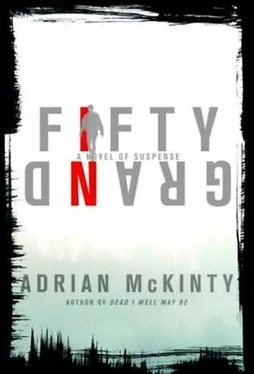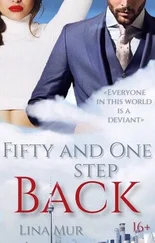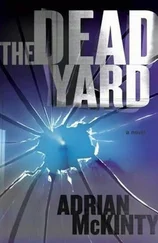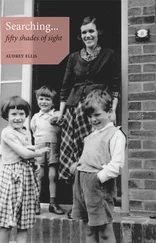At least not reason enough.
At least not for me.
“Oh no,” I say to myself. “No, no, no.”
“What are you g-going t-to d-do?” he asks.
“Fuck!” I yell out loud and put down the gun.
Going to have to lift you out, you bastard. Going to have to try and save you.
How? Under the armpits, drag him. “Put your arms out,” I tell him.
But in the last minute hypothermia has started to set in. His eyes are fixed. The cigarette is burning him and he doesn’t even notice.
“ Mierde! I’m going to fucking save you.”
I rip the cig from his mouth.
I kneel behind him, shove my hands under his wet, frozen shoulders, and try to heave him out backward.
I can’t get purchase.
I pull again.
Distracted, I don’t notice, behind me on the hill, Jack Tyrone, Deputy Crawford, Deputy Klein, and Sheriff Briggs get out of the black police Cadillac Escalade. I don’t hear Sheriff Briggs talk about the panic button on Youkilis’s house phone or the homing GPS in his BMW. I don’t notice them examining Youkilis’s car or see them as they follow the footsteps that lead down to the lake. I don’t see any of them look up, startled, when they hear me yell.
And what do they see?
POV shift to the main man, Briggs. Furious. Jubilant. A rifle in his hands. Like John Wayne at the end of all those Yuma flicks. Here with the Seventh to save the day.
“Let’s go, boys,” and they run through the trees to the water’s edge.
Briggs sees me trying to pull Youkilis out of the hole, but it can’t be obvious that I’ve changed my mind, that I’m trying to save him. Probably he thinks I’m administering the coup de grâce.
Maybe he doesn’t care what I’m trying to do.
He unslings a high-velocity.270 elk-hunting rifle with a manual sight. The sight is set for a hundred meters and I’m a little closer than that.
Aim a tad high, he thinks.
He’s never shot a woman before. But he doesn’t feel that that’s an issue. He’s calm, focused, professional. Don’t even think of her as a woman. Goddamn wetback bitch. And besides, this is your job. This ain’t nothing. This is taking out soldiers on the Basra road. This is bagging boar in the Rio Grande brush country. This is a duck shoot on the Kansas line.
He fixes my skull in the T of the manual crosshair.
He sniffs the breeze, adjusts for it, and moves the T to the back of my head.
“Yes,” he says, and just like that, the whole of the sensual world goes-
The bullet struck me on the head. Ice gone. New Mexico gone. Colorado gone. All of it… gone.
And that was good. That was as it should be.
I shouldn’t be here. I need to be elsewhere. Across America, across the sea. Back to the island of the crooked mouth. Over the forests and plantations. Over the jungle. Across the years.
Smell is the most basic part of memory. What is that smell? The aroma of cigars and mangrove and somewhere bacon soldering itself onto an unwatched pan.
A lazy day in autumn. A school holiday.
We’d taken the train to Santiago de Cuba. That long, long train. No matter how much you pack, all the food runs out and the water runs out and it breaks down and you think it’s never going to get there. You could walk faster than that train for much of the journey.
Ricky and I do, slipping out of the last carriage and running behind and jumping on again.
My uncle’s Arturo’s house. A large, white two-story sugarbeet overseer’s place from the twenties. An American UFC man built it and my uncle took it after the Revolution. I say Santiago but it’s not really in the city at all. An unnamed village on the edge of the mangrove forest and the sea. Four streets. A road. Swamp.
Country cousins. And every other kid a friend.
Hot.
Very hot…
Some of the kids were playing hide-and-seek at the far end of the road, where the neighborhood was almost swallowed up by abandoned plantations. Halfhearted attempts were being made to look for people and there were halfhearted attempts to hide.
Ricky and I were lying in the yard, watching everything from under the shade of the big warped palm tree. Palm trees curve up at thirty degrees but this one had a gentle slope that bent back on itself, as if it had been designed for climbing. Even toddlers could get halfway up it-there had been accidents.
It was 1993, right in the heart of the “special economic period.” Communism had collapsed in Russia, and Cuba had no friends. This was before the Venezuelans or the Chinese or the roaring comeback of the sex trade. Blackouts were common in Havana and there was no traffic anywhere.
A nice day.
Some of the older people had brought chairs to catch a few rays of the sun before it vanished behind the stone wall of the graveyard. Mostly women, knitting, repairing clothes, talking. Mrs. Ramírez and her sister in the street in front of us saying things about the decline of morals among kids today. Mrs. Ramírez reckoned that a decent haircut would improve the behavior of most of the unruly boys in Santiago, whereas her sister favored a good kick in the ass.
When they began talking about what was wrong with girls today I stopped listening.
“Come on, little guy, come on.”
I looked up sleepily. Ricky was trying to coax one of the swamp iguanas to come into the garden with a ropey string of sausage. But all the iguana wanted was to be left alone.
“Where did you get those ’izos?” I asked Ricky.
“Kitchen.”
“Aunt Isabella will kill you.”
“She’ll never know,” Ricky said.
“Iguanas only eat insects,” I said.
“Not so, Dad says they eat mice. Meat,” Ricky said.
“Kids, are you outside?” Dad’s voice.
“Get rid of those sausages, Dad will go crazy. You know what he’s like about wasting food,” I hissed.
“They’re not from the ration. Aunt Isabella has half a dozen strings like this in the pantry.”
“Get rid of them.”
“What do you want me to do?” Ricky asked.
“I hear you. Wait there, kids. Don’t go anywhere,” Dad yelled from an upstairs window.
I grabbed the string of sausages and hurled them up into the palm tree branches. They caught first time.
“Dad, we’re over here,” I yelled back.
Dad came out of the house. He was wearing a loosely buttoned white shirt, tan army trousers, and a pair of checked slip-on shoes. He had shaved and combed his unruly hair.
“Hi,” we said.
Dad nodded, walked past us, and looked down the street. He said buenos días to Mrs. Ramírez, even calling her señora instead of comrade. She smiled when he spoke to her. Everyone did. Dad was well liked and he got on with all strata of society. Mrs. Ramírez asked him about his job and he said something about how he loved it, how he always wanted to sail the seven seas. Mrs. Ramírez laughed, because the only stretch of sea Dad’s vessel ever went to was from one side of Havana Bay to the other.
When the pleasantries were over with the neighbors he sat on the white, dusty ground next to Ricky and me.
His eyes were dark like his hair, his nose long and angular. In fact, he was all angles. Skinny even. He was about forty, but he looked younger and was still very handsome. Childbirth, especially Ricky’s breech, had ruined Mom’s looks. She had a worn, worried expression all the time that was no doubt exacerbated by the monthly food crunch and by the throwaway affairs Dad had with women he met on the ferry.
“Why aren’t you playing with your cousins?” Dad asked me.
“I don’t know,” I said.
“Did you have a fight?”
Sometimes María and Juanita put on airs because they lived in a big house and we only lived in a scuzzy Havana solar . But that didn’t happen often because we could always call them country bumpkins, or if we were really feeling mean we could point out that they were leche con una gota de café, because their grandmother (like many people in Santiago) was from Haiti.
Читать дальше










